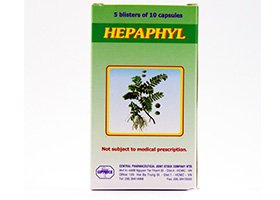
All iLive content is medically reviewed or fact checked to ensure as much factual accuracy as possible.
We have strict sourcing guidelines and only link to reputable media sites, academic research institutions and, whenever possible, medically peer reviewed studies. Note that the numbers in parentheses ([1], [2], etc.) are clickable links to these studies.
If you feel that any of our content is inaccurate, out-of-date, or otherwise questionable, please select it and press Ctrl + Enter.
Hepafil
Medical expert of the article
Last reviewed: 04.07.2025

Hepafil is a medicine with a combined composition of components. The extract of the substance Phyllanthusi amarusi helps to inactivate the action of viruses that lead to the development of hepatitis B.
The principle of the drug’s influence is determined by its ability to suppress the activity of viral DNA polymerase enzymes, as a result of which the processes of DNA replication and transcription of the cells of the pathogenic bacteria are disrupted, which subsequently causes their death.
ATC classification
Active ingredients
Pharmacological group
Pharmachologic effect
Indications Hepafila
It is used to treat diseases that cause disorders in the hepatobiliary system (including cholecystitis, chronic hepatitis, liver cirrhosis, cholangitis and dyskinesia in the biliary tract) to reduce the activity of liver enzymes (ALT and AST elements).
Release form
The medicinal element is released in capsules - 50 pieces per package.
Pharmacodynamics
Turmeric extract contains the element curcumin. The substance stabilizes liver function and the functional state of the gastric mucosa, and at the same time has an anti-inflammatory and choleretic effect.
Turmeric has a significant antiulcer effect, eliminates the feeling of heaviness and flatulence associated with eating food, and also stimulates the process of bile formation in the liver, as well as its outflow. Along with this, turmeric regulates digestive processes, helps to excrete cholesterol from the blood and has antimycotic activity in case of intestinal dysbacteriosis.
Dosing and administration
The medicine is taken orally. The portion size and the duration of the therapeutic course are determined individually by the attending physician.
For adolescents over 12 years of age and adults, the daily dose is usually 2-3 capsules, 3 times, with or before meals. Children aged 3-12 years are required to take 1-2 capsules 2-3 times a day.
 [ 1 ]
[ 1 ]
Use Hepafila during pregnancy
There is no experience of using the medication during breastfeeding or pregnancy.
Contraindications
It is contraindicated to use the medication if there is personal intolerance to any of its elements. Also, it is forbidden to drink alcoholic beverages during therapy.
Side effects Hepafila
The medication is often tolerated without any complications. Occasionally, allergy symptoms may occur, manifesting on the epidermis (redness, rash or itching).
Storage conditions
Gepafil should be stored in a place closed to small children. Temperature level – within the standard marks for storing medicines.
Shelf life
Hepafil can be used for a 2-year period from the date of release of the medicinal substance.
Application for children
It is prohibited to use Hepafil in children under 3 years of age.
Analogues
Analogues of the drug are Bonjigar, Apkosul, Essel forte, Phosphogliv with Lecithin, and in addition to this Vimliv, Livenciale, Esavit with Livolakt, Essliver forte with Livolin and Hepatofalk with Milk Thistle. In addition, the list includes Essentiale, Triliv, Hepalin, Phospholip with Hepophil and Glutarsol.
Manufacturer
Attention!
To simplify the perception of information, this instruction for use of the drug "Hepafil" translated and presented in a special form on the basis of the official instructions for medical use of the drug. Before use read the annotation that came directly to medicines.
Description provided for informational purposes and is not a guide to self-healing. The need for this drug, the purpose of the treatment regimen, methods and dose of the drug is determined solely by the attending physician. Self-medication is dangerous for your health.

